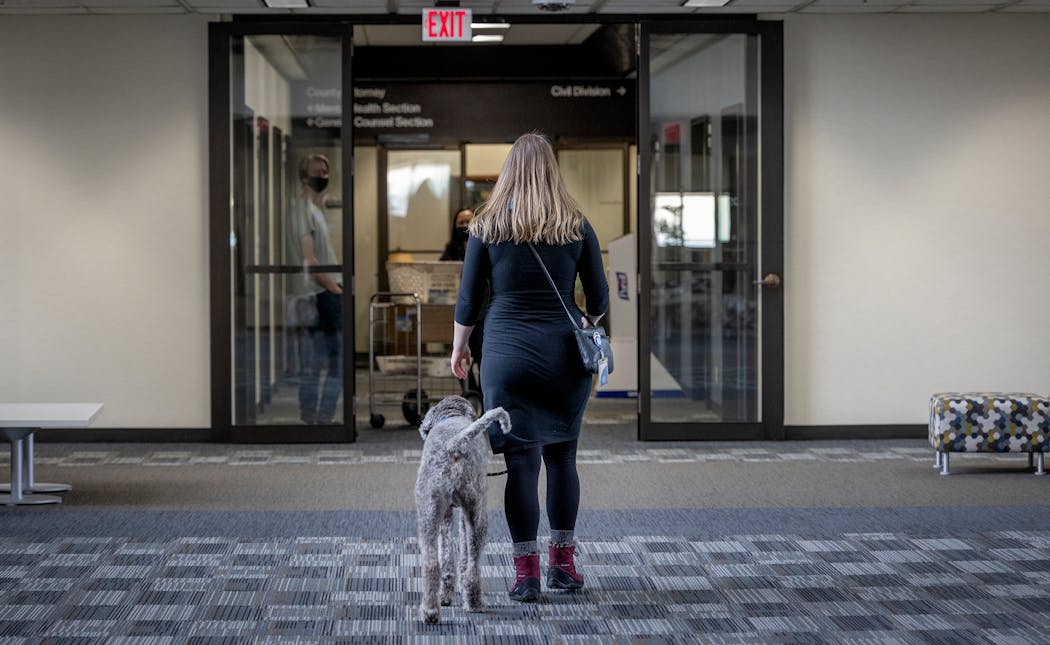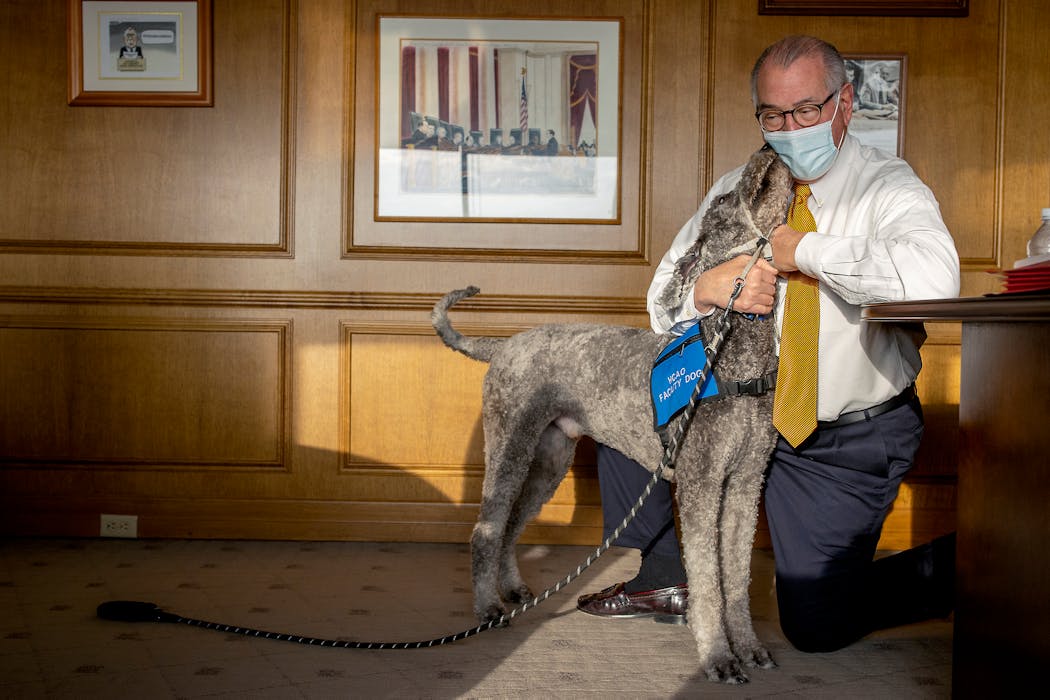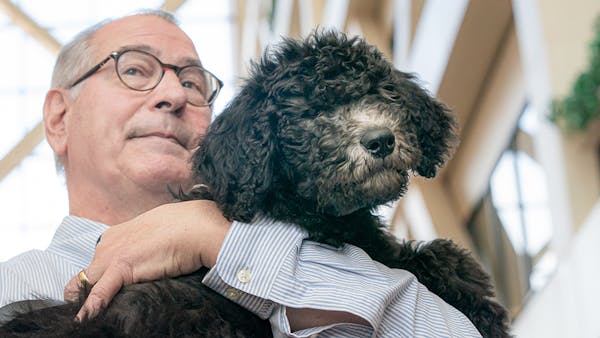Keli Trautman wasn't alone when she met with the teen, a victim of sexual abuse who was preparing to testify in court.
Trautman, a paralegal and victim witness coordinator for the Stearns County attorney, was accompanied by a prosecutor and Nova, a 4-year-old golden retriever.
"The teen was looking straight ahead. She was traumatized and didn't want to meet with us," Trautman said. "She wasn't sobbing audibly but tears were running down her face. Nova saw that and went right up to her."
Nova has been a calming presence since she joined the Stearns County Attorney's Office in 2019. With Trautman as her handler, she's met with dozens of young crime victims to ease what is often a wrenching experience.
"We deal with people in tough spots, when something really bad has happened," said Stearns County Attorney Janelle Kendall. Nova, she said, "is able to sense the stress and be a positive influence."
Unlike law enforcement canines that partner with police or are assigned to sniff out drugs or bombs, the job of courthouse dogs is to be a soothing presence. And while service, therapy or emotional support dogs focus on supporting a single individual, facility dogs are bred and trained to read the cues of any number of people and know when to nuzzle, snuggle, let themselves be petted or just lie quietly nearby.
Unleashing tension
Norie is the facility dog at the Ramsey County Attorney's Office. Like her littermate Nova, Norie spent her first two years in a professional training program with Helping Paws, an assistance-dog organization in Hopkins.
After that, both dogs received additional training in the legal field. Norie and Nova are two of the three courthouse dogs working as canine helpers in Minnesota. There is also a courthouse dog in the Hennepin County Attorney's Office.
Norie lives with handler Bill Kubes, a Ramsey County victim/witness advocate. He keeps his 55-pound charge in top shape by exercising her, brushing her teeth and reinforcing her skills every day. In addition to sit, shake, drop and stay, Norie has ice breaker tricks. She can can turn on a light switch with her snout or use her mouth to carry a basket filled with trading-card-style pictures of herself, which she offers to new acquaintances.
"It's hard to explain how wonderful she is," said Kubes. "Everyone she meets sees it."
Kubes has witnessed Norie's impact in pretrial meetings, where she serves as a companion for witnesses or victims in abuse, neglect, domestic violence and criminal cases.
"There was a 10-year-old in a sexual abuse case who was scared and didn't want to explain what happened to her to a bunch of adults she didn't know," he said. "Norie came in and she played with her a while and put her at ease. She said 'I love Norie' when we were done."
Unleashing the tension can make the legal process more humane for the vulnerable, said Ramsey County Attorney John Choi.
"Preparing witnesses for trial can re-traumatize them," he said. "A better experience helps alleviate that."
New tricks
While facility dogs are new in Minnesota, they have become common in many criminal justice settings. The Courthouse Dogs Foundation estimates there are 273 facility dogs working in 41 states and nine countries around the world.
"This is an idea that has spread because it works," said Ellen O'Neill-Stephens, co-founder of the Washington-state-based foundation. "This is not just a feel-good thing; there's evidence the presence of the dog is an asset."
O'Neill-Stephens, a retired county prosecutor in Seattle, unintentionally created the first courthouse dog when she brought her disabled son's assistance dog to work. A fellow prosecutor asked to borrow the Lab retriever while interviewing a shy boy in an abuse case.
"Right away, we saw that a trained dog benefits the fact-finding process," she said. "A calm witness doesn't shut down and is better able to think about and articulate what happened to them."
In 2004, her office got the first facility canine in the world. Since then, the American Bar Association and the National District Attorneys Association have endorsed facility dogs. There also has been research that confirmed that stress levels drop when a child witness is interviewed in the presence of a trained canine.
Courtroom-ready
In at least 15 states, courthouse dogs also accompany witnesses while they testify before a judge and jury. In Minnesota, they have worked with witnesses and victims only in pretrial and investigative proceedings, but that may be about to change.
Both Stearns and Hennepin county prosecutors' offices say they are ready to approach district court officials and request that their facility dogs be present in courtroom proceedings, including trials.
"We are prepared to do this when the right case arrives," said Kendall.
Hennepin County's certified facility dog, Barrett, is also being readied to enter courtrooms during trials.
The long-legged golden doodle arrived at the Hennepin County Attorney's Office a little over two years ago. He has been meeting with victims, but his integration into formal courtroom testimony has been slowed by the pandemic, when fewer in-person proceedings have been scheduled.
"Judges are reasonably concerned about a dog in their courtroom, but when they meet Barrett they understand how attentive and well behaved he is," said Jean Burdorf, managing attorney of Hennepin County's special litigation division.
"We've been informally bringing him to district court to introduce him. As activities open back up I've promised our chief judge we will do a seminar to prepare our judges," she said. "But if the right case came up where it would be critical for Barrett to be there, he is ready now."
In Ramsey County, Choi said he's in the midst of "long conversations" with judges and court administrators about using Norie in courtrooms. He's confident that Norie's skills and the track record of courthouse dogs will win over any doubters.
"Norie is here to stay," Choi said. "She's become part of what we do and how we do it."
Hennepin County Attorney Mike Freeman hopes to use Barrett beyond the criminal courtroom, in child protection hearings or juvenile court proceedings that do not have juries.
"These can be difficult cases when a young person may even have to to testify against their mother or father. I've heard from other DAs who say these dogs help witnesses to speak the unvarnished truth in a way that even the most compassionate lawyers and victim advocates can't," he said.
Freeman finds that Barrett's presence has also contributed to a more tranquil work culture for his staff.
"It is more tense here right now; the cases we are trying are more serious," he said. "I find my own stress level goes down around Barrett. I swear he smiles at me."

Kao Kalia Yang, Edel Rodriguez and others bring us gorgeous new picture books

After 4 decades in music and major vocal surgery, Jon Bon Jovi is optimistic and still rocking

Lt. Gov. Peggy Flanagan hits the runway at Native Nations Fashion Night




